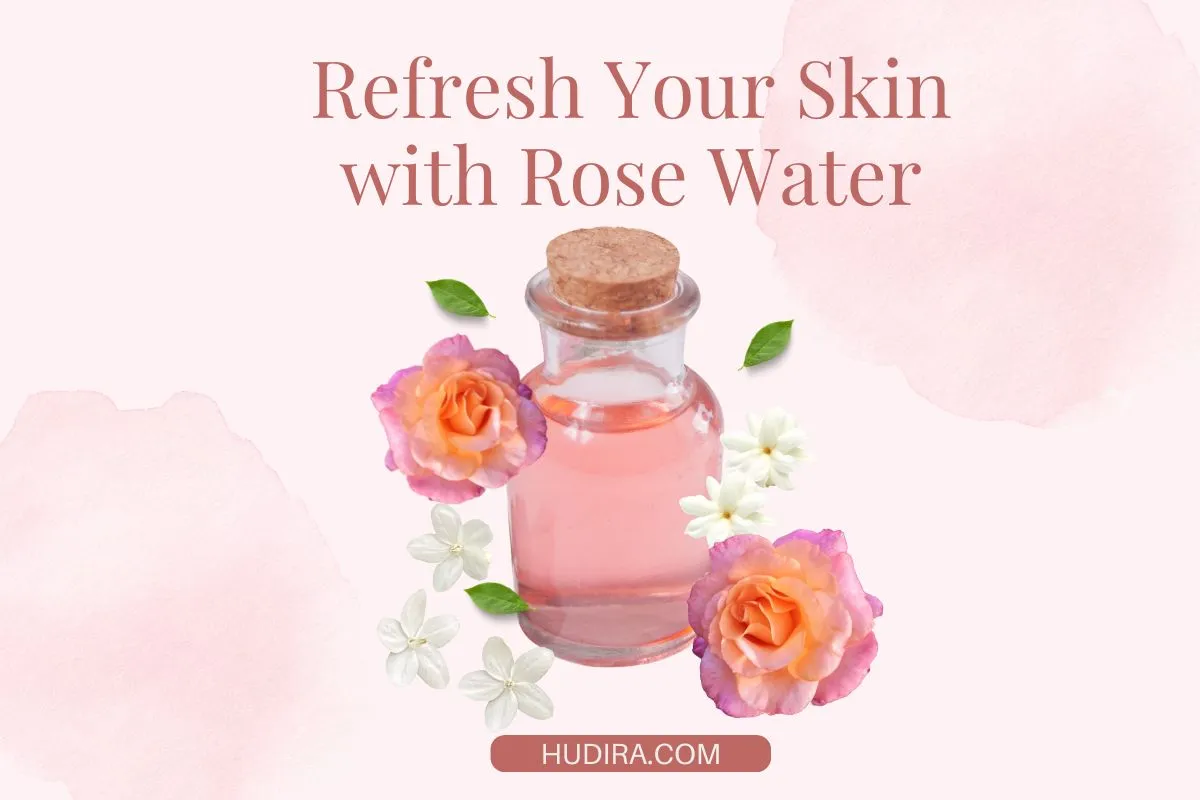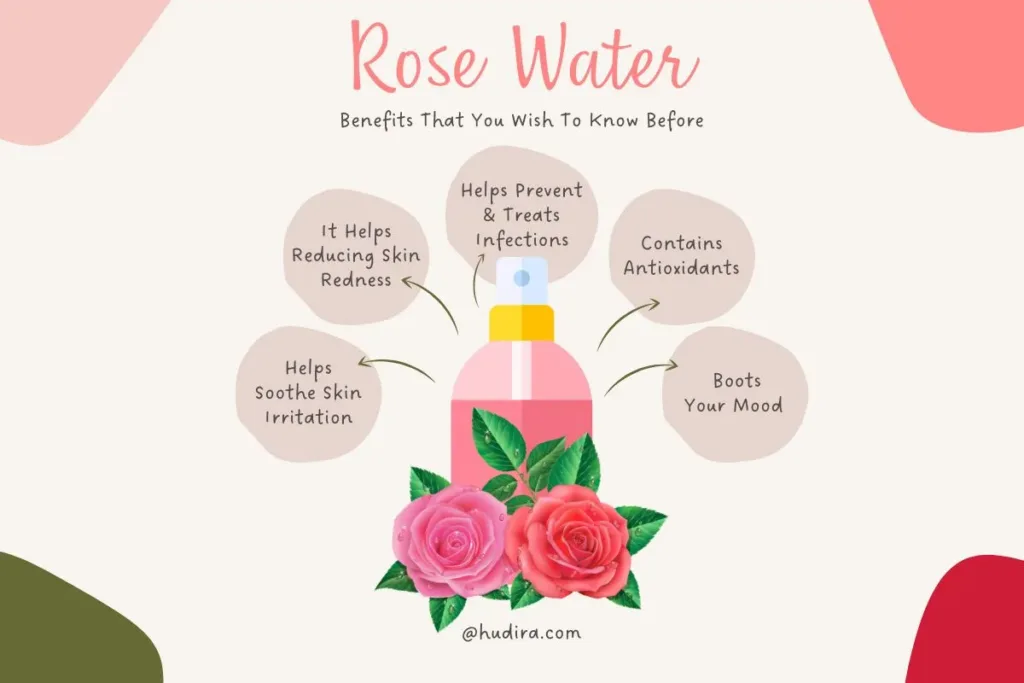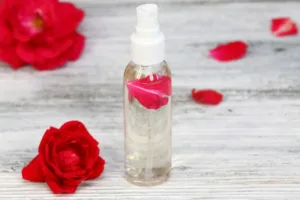No products in the cart.

For centuries, rose water has been cherished across cultures as a symbol of beauty, purity, and gentle care. Known for its intoxicating aroma and soothing properties, this floral elixir—commonly called gulab jal in South Asia—is more than just a fragrant mist. It’s a skincare essential that delivers a powerhouse of benefits, gently hydrating, calming, and restoring balance to your skin. Whether you have dry, oily, or sensitive skin, rose water works in harmony with your skin’s natural rhythm.
But what exactly makes rose water for skin so magical? Could this timeless potion be the missing piece in your skincare routine? In this blog, we’ll unveil the science and tradition behind rose water benefits for skin, explore why it deserves a permanent spot on your shelf, and reveal how you can use it for glowing, healthy skin. Ready to discover this ancient beauty secret? Let’s begin.
What Is Rose Water?
Rose water is a natural by-product of rose essential oil production, typically obtained through steam distillation of fresh rose petals—most commonly from the Rosa damascena or Rosa centifolia species. During this process, steam passes through the petals, capturing both the aromatic compounds and the water-soluble nutrients of the flower. The resulting liquid, known as rose hydrosol, contains trace amounts of essential oil along with powerful antioxidants, flavonoids, and vitamins.
What makes rose water for face unique is its dual function: it’s therapeutic and cosmetic. In Ayurvedic, Persian, and Unani traditions, rose water (gulab jal) has been used for centuries to purify the skin, calm the mind, and even flavor sacred offerings. Its soothing fragrance, natural toning properties, and ability to nourish the skin barrier have made it a must-have in both ancient beauty rituals and modern skincare routines.
Rose Water Benefits for Skin

1. Hydrates and Refreshes the Skin
One of the most celebrated rose water benefits for skin is its ability to deeply hydrate without clogging pores. It acts as a humectant, drawing moisture from the air into the skin and locking it in. This is particularly helpful for those with dry, flaky, or tight skin, as rose water for skin restores comfort and suppleness.
When sprayed as a mist, rose water for face instantly refreshes and cools the skin, making it ideal for use throughout the day—whether you’re exposed to dry office air, post-exercise, or during hot summer months. Unlike synthetic sprays that might contain alcohol, rose water doesn’t strip your skin’s natural oils. Instead, it enhances your skin’s hydration barrier, supporting elasticity and glow.
Moreover, incorporating rose water for skin into your morning and evening skincare routine boosts the efficacy of serums and moisturizers that follow, allowing your skin to better absorb other beneficial ingredients.
2. Soothes Redness and Irritation
If your skin is sensitive, acne-prone, or reactive, rose water for skin acts as a gentle healer. Its natural anti-inflammatory and antioxidant properties make it an excellent remedy for a variety of skin concerns, such as:
- Rosacea flare-ups
- Sunburn or windburn
- Razor irritation
- Mild eczema and dermatitis
- Itchiness due to dryness or allergic reactions
Rose water contains polyphenols like flavonoids and tannins, which help calm inflamed skin, reduce the appearance of blotchiness, and strengthen capillaries. These compounds combat oxidative stress, one of the main contributors to redness and premature aging.
In traditional South Asian households, gulab jal is applied using cotton pads soaked in chilled rose water for skin to soothe tired or inflamed skin. This ancient practice remains highly relevant today and is especially beneficial after treatments like waxing, exfoliation, or facial peels.
3. Balances Skin’s Natural pH
Your skin’s surface maintains a slightly acidic pH (around 4.5–5.5), referred to as the acid mantle. This fine layer of sebum and sweat acts as a protective barrier against environmental pollutants, bacteria, and dehydration. However, everyday stressors like:
- Over-cleansing
- Harsh soaps or scrubs
- Pollution
- Poor diet
can disrupt this balance, leading to issues like breakouts, dryness, dullness, and sensitivity.
Rose water for face has a natural pH close to that of healthy skin, which means it can restore your skin’s ideal balance without the need for harsh ingredients. Used after cleansing and before moisturizing, rose water acts as a buffering toner, helping your skin transition smoothly between steps.
Additionally, consistent use helps reduce trans-epidermal water loss (TEWL) and supports the skin’s microbiome—your first line of defense against infection and inflammation.
4. Acts as a Natural Toner
Toners are used in skincare routines to help remove residual impurities after cleansing and to restore the skin’s pH level before moisturizing. However, many commercial toners contain alcohol or harsh astringents that can irritate or dry out the skin—especially sensitive or acne-prone types.
Rose water for face is a gentle, natural toner that does the job without the drawbacks. Its astringent properties help tighten pores, refine texture, and smooth the surface of the skin without causing dehydration. This is particularly beneficial after cleansing, as it removes any lingering soap or oil while prepping your skin to better absorb serums, oils, or moisturizers that follow.
How it works:
- Tightens pores naturally without clogging them.
- Removes microscopic debris and product residues.
- Soothes skin and reduces post-cleansing inflammation.
When applied with a cotton pad or as a facial mist, rose water for face helps create a clean, hydrated canvas for the rest of your skincare routine, leaving your skin feeling fresh and soft.
5. Reduces Acne and Breakouts
Is rose water good for skin that’s prone to acne? The answer is a clear yes—and here’s why.
Rose water for face contains natural antibacterial and antiseptic compounds that help kill acne-causing bacteria (like P. acnes) while maintaining the skin’s natural moisture. It’s also anti-inflammatory, meaning it can reduce redness, swelling, and pain associated with pimples and cystic acne.
Unlike harsh acne treatments that can strip the skin and worsen oil production, rose water for skin works gently. It helps:
- Cleanse clogged pores
- Minimize oiliness
- Balance sebum production
Plus, because rose water for skin has a mild astringent effect, it helps shrink pores, reducing the chance of dirt and oil buildup that leads to breakouts. For people with combination or oily skin, using rose water for face regularly as a toner or mist can keep skin calm, matte, and breakout-free—without over-drying.
Pro Tip: Combine rose water with a few drops of tea tree oil or witch hazel for a natural anti-acne toner, but always do a patch test first.
6. Prevents Premature Aging
Your skin is constantly under attack from free radicals—unstable molecules generated by UV rays, pollution, stress, and poor diet. These free radicals are a major cause of oxidative stress, which breaks down collagen, leads to pigmentation, and accelerates the formation of wrinkles and fine lines.
Rose water for skin is rich in powerful antioxidants like:
- Vitamin C – boosts collagen synthesis and brightens skin.
- Vitamin E – protects the skin barrier and reduces sun damage.
- Polyphenols & Flavonoids – neutralize oxidative stress.
Using rose water for skin daily can enhance your skin’s resilience, firm sagging areas, and slow down visible signs of aging. Unlike synthetic anti-aging products, rose water benefits your skin gently and safely—making it suitable even for mature or sensitive complexions.
Additionally, rose water for skin improves blood circulation, which helps maintain the elasticity and tone of facial skin. Over time, you’ll notice a smoother texture, improved glow, and softer fine lines.
7. Fades Dark Spots and Scars
Dark spots, acne scars, and post-inflammatory hyperpigmentation (PIH) are common concerns—especially in melanin-rich skin. Rose water for face, when used consistently, helps to lighten and heal these marks thanks to its regenerative and anti-inflammatory properties.
How it works:
- Rose water supports cell turnover, which helps fade scars and stimulate fresh skin growth.
- It boosts the effectiveness of brightening agents like niacinamide, licorice extract, or vitamin C.
- It calms the inflammatory process that causes red or purple pigmentation after acne.
While rose water isn’t a bleaching agent, its soothing and balancing actions gently improve skin tone over time without irritation or peeling.
Use it:
- As a base before applying your brightening serum.
- Mixed with natural ingredients like saffron, turmeric, or aloe vera for DIY masks.
- As a face mist throughout the day to enhance your skin’s glow.
8. Enhances Mood and Reduces Stress
Beyond its skincare advantages, rose water for skin offers profound psychological benefits thanks to its natural aromatherapeutic properties. The scent of rose water for face is not only refreshing—it also has a calming effect on the nervous system.
Why it works:
- The aroma of rose petals stimulates the olfactory system, sending signals to the brain’s limbic system—the part that governs emotions and memory.
- In aromatherapy, rose is used as a mild antidepressant, known to reduce anxiety, promote emotional well-being, and ease symptoms of stress or insomnia.
How to use rose water for emotional uplift:
- Spritz it onto your pillow or linens before bed to enhance relaxation and promote better sleep.
- Use during meditation or yoga to create a serene environment and enhance focus.
- Keep a bottle in your workspace for a quick mental refresh during stressful moments.
This benefit aligns beautifully with the growing movement of holistic skincare, where emotional and skin health are considered deeply interconnected. Glowing skin isn’t just about what you apply—it’s also about how you feel. Rose water supports both.
9. Soothes Post-Sun Skin
Sun exposure can lead to redness, dehydration, inflammation, and free radical damage—all of which accelerate skin aging. While sunscreens and sunblocks are essential before sun exposure, aftercare is equally important. This is where rose water shines.
How rose water for skin helps after sun exposure:
- Cools and soothes sunburn or overheated skin.
- Reduces inflammation and redness caused by UV damage.
- Hydrates dry or parched skin post-sun.
- Delivers antioxidants to help counteract free radical activity.
Why it’s better than synthetic after-sun products:
Many commercial after-sun gels or sprays include synthetic fragrances, dyes, or alcohol that can further irritate sun-damaged skin. In contrast, rose water for skin is:
- 100% natural
- Free from alcohol or harsh chemicals
- Safe for sensitive skin
Pro Tip:
Keep a bottle of rose water in your refrigerator. Spritz it on your face, neck, and arms after sun exposure for instant relief, hydration, and a touch of floral calm. You’ll feel the difference within seconds.
10. Supports Skin Healing and Detoxification
Rose water isn’t just for pampering—it has medicinal-grade properties that support the skin’s natural healing and detox mechanisms. This makes it ideal for treating minor injuries and maintaining overall skin health.
Healing Properties:
- Contains antiseptic and antibacterial compounds that prevent infection in minor cuts, burns, and rashes.
- Speeds up wound healing by encouraging tissue regeneration and calming inflammation.
- Useful for post-waxing or post-threading care to prevent redness and irritation.
Detoxification Benefits:
Daily exposure to pollution, makeup, sweat, and stress causes toxin buildup on your skin’s surface, often clogging pores and dulling the complexion.
Rose water for face helps:
- Gently cleanse the skin of impurities without stripping it.
- Balance sebum production, preventing congestion and blackheads.
- Flush out environmental toxins, particularly when used in facial steaming or cleansing routines.
Ways to use rose water for healing and detox:
- Apply directly to cuts or razor burn using a sterile cotton pad.
- Mix with bentonite or kaolin clay for a detoxifying face mask.
- Add to warm water for a facial steam session that clears pores while calming your mind.
How to Use Rose Water in Your Skincare Routine

- As a Toner: After cleansing, apply rose water with a cotton pad or spray bottle to tone and tighten pores.
- In DIY Face Masks: Mix rose water with clay, turmeric, or aloe vera for a soothing mask. Or use our brightening face mask which contains rose.
- As a Facial Mist: Keep a bottle in your bag for a mid-day refresh—especially helpful in hot or dry climates.
- With Makeup: Use it as a setting spray or mix it with foundation for a dewy finish.
- As an Eye Compress: Soak cotton pads in chilled rose water to reduce puffiness and soothe tired eyes.
Final Thoughts
Incorporating rose water into your skincare routine is a simple step that delivers radiant results. With its natural ability to hydrate, heal, and harmonize your skin, this botanical gem is a must-have in any routine—modern or ancient.
So, is rose water good for skin? The answer is a resounding yes. Whether you call it gulab jal or rose hydrosol, its time-tested benefits make it a true beauty essential.
Ready to experience the soothing magic of natural skincare products? Try Hudira’s 100% organic products today and elevate your skincare with nature’s own tonic for beauty. Shop now on Hudira.com!
FAQs
Q. Can I use rose water daily on my face?
Yes, rose water is gentle enough for daily use and suitable for all skin types.
Q. What is the best time to apply rose water?
Apply after cleansing, before moisturizing—morning and night.
Q. Is rose water good for oily and acne-prone skin?
Absolutely! It balances oil production and fights acne-causing bacteria.
Q. Can I apply rose water directly to my face?
Yes, pure rose water can be sprayed or dabbed directly on the skin.
Q. Is rose water safe for sensitive skin?
Yes, but do a patch test first to rule out any allergic reactions.



Add comment